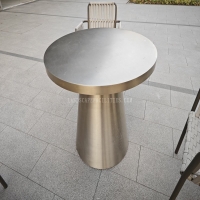Welcome to the website for landscape facilities products and knowledge.
How does the choice of countertop thickness impact the load-bearing capacity of a landscape bar counter?
The structural integrity of a landscape bar counter fundamentally depends on selecting appropriate countertop thickness. This critical dimension directly influences how the surface distributes weight across supporting structures, determines resistance to deflection under pressure, and affects long-term durability in outdoor environments.
Standard countertop thicknesses typically range from 2cm (¾") to 5cm (2") for natural stone and engineered materials. Thinner profiles (2-3cm) require substantial substructure support through closely spaced brackets or full plywood decking to prevent sagging under typical bar loading conditions of 300-500 pounds distributed weight. These thinner surfaces prove adequate for residential applications with moderate use but risk cracking if subjected to concentrated point loads or impact damage.
Medium-thickness countertops (3-4cm) offer improved load distribution characteristics without proportional increases in material cost. This thickness range demonstrates notably better performance spanning support gaps up to 24 inches while maintaining acceptable deflection limits of L/360 under standard loading conditions. The additional mass provides inherent stability against vibration and accidental impact.
Premium thickness options (4-5cm) deliver superior load-bearing performance through enhanced structural depth. The increased thickness creates a stiffer moment-resistant section that can span greater distances between supports – up to 36 inches for some stone varieties. This substantial profile effectively resists thermal stress cracking in outdoor applications and provides necessary mass to withstand occasional uneven loading from multiple users leaning simultaneously.
Material composition interacts significantly with thickness in determining performance. Quartz composites maintain higher flexural strength at thinner dimensions compared to natural stone, while granite and marble require additional thickness to achieve equivalent load ratings. Concrete counters typically demand minimum 4cm thickness with adequate reinforcement to prevent tensile failure.
Engineering calculations reveal that doubling countertop thickness increases stiffness by approximately 800% while reducing deflection by corresponding proportions. This non-linear relationship means even modest thickness increases yield substantial improvements in load capacity. For critical applications involving cantilevered sections or minimal substructure, thicker profiles provide essential safety margins against failure.
Professional installers factor anticipated usage patterns, climate exposure, and support spacing when recommending thickness. High-traffic commercial installations typically specify 4-5cm thickness with additional support reinforcement, while residential applications may utilize 3cm material with proper substructure design. The optimal selection balances structural requirements with aesthetic preferences and budget constraints.
Ultimately, countertop thickness serves as the primary determinant of load-bearing capacity in landscape bar counters. Investing in appropriate thickness ensures both immediate performance and long-term reliability of outdoor entertainment spaces, preventing costly repairs or replacements due to structural inadequacy.
Related search:

Recommendation
Outdoor Metal Table - Classic Outdoor Furniture, Stainless Steel Table, Durable and Reliable